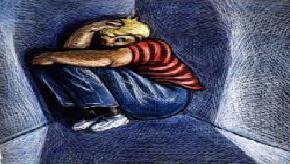Articles
Fear is a feeling of great concern at the notion of a real or imagined danger. It’s a protective and healthy human being reaction.

Who has never felt afraid of someone, some situation or yourself? For example, it’s late at night, you’re alone watching TV when a door slams. The heart races, muscles get tense and all the senses are alert. A few seconds later when you realizes that was just the wind and not an unusual event, you come back to relax. It happens because in times of danger your brain triggers a mechanism that aims to make you more able to escape or to fight in order to preserve life. The trigger that sets this circuit is an old friend: fear.
Usually there is a kind of fear for each phase of life:
- In childhood: fear of the dark, the bogeyman, the death of your the mother or your father, to be an adopted son… Imagination builds, swells, and sometimes imprisoned, making the monster under the bed capable of swallow us at any time.
- In adolescence: The fear of not wearing the right clothes on the first day of school, to be the last one kissed on the mouth, to be unpopular, gaining weight, having a face full of pimples, not passing the entrance and driving exam, the divorce of your parents…
- At maturity: The fear of not getting married, having children and not know how to take care of them, not being able to buy a house, become unemployed, not having friends, not be successful at work, to divorce and so on…
- In old age: The fear of getting sick, not having time to live with your grandchildren, dying, losing memory, being alone, to depend on others …
In everyday life we are placed in front of several situations where we must decide whether to confront or stop. Sometimes we give up for the fear of dealing with uncertain of a greater or lesser degree. Everyone fears something: assaults, airplanes, kidnap, pain, etc.. But it is clear that the intensity of fear is intensified by the history of each one.
There are many stories of people who go to a meeting or presentation with everything at their fingertips, but at the last minute they can barely mumble a word. And when that great idea of yours, that you didn’t dare to present, is finally suggested by a colleague and welcomed by all as the great solution of the problem? You think: Why haven’t I said anything?
You haven’t said because you were afraid. Fear of things that you thought it could happen, fear of someone not liking your idea, to be consider incompetent or embarrassment. The problem isn’t the fear, is not knowing how to manage this feeling, because there’s nothing wrong with being afraid, it’s, indeed, a basic sense of human life. Even the fear of making mistakes is natural. It’s the fear of being run over, for example, that makes us look at both sides of the street before crossing it.
The problem is when it becomes exaggerated to the point where we start to decline too much without realizing it, collecting a series of withdrawals, which along the way generate a great deal of frustration, insecurity, low self-esteem and more fear.
At this point that fear is no longer a primary feeling (as love and anger) and becomes more complex, requiring care. So why not take a stock of the fears that trouble you, even the smallest? Acknowledging them is the first step.
Myriam Durante
Psychotherapist
